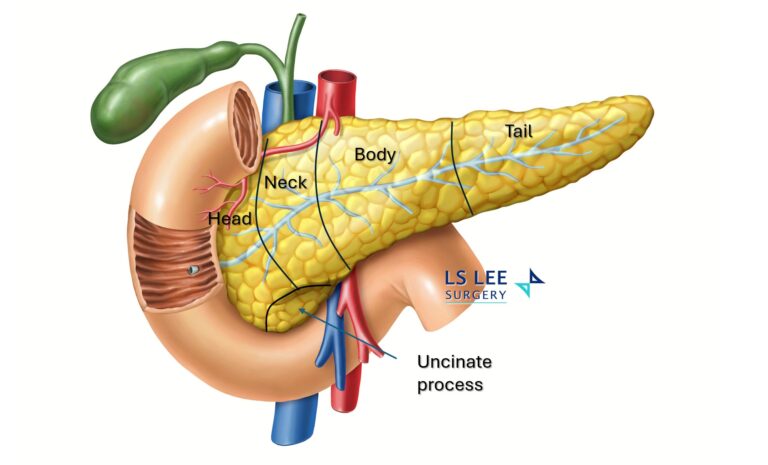Pancreatic Cancer Treatment in Singapore: Symptoms, Diagnosis, Treatment & Prevention
What is the Pancreas?
The pancreas is a long, flat organ that sits behind the stomach near the first part of the small intestine (duodenum). It has four sections — head, neck, body, tail—and two main jobs:
- Digestive enzymes to help break down food
- Hormones (like insulin) to regulate blood sugar
Pancreatic cancer happens when cells in the pancreas grow abnormally and form a tumor. The most common type is pancreatic ductal adenocarcinoma (PDAC). Less common types include pancreatic neuroendocrine tumors (PNETs) and malignant cystic tumors.

Common Types of Pancreatic Tumors
- Pancreatic ductal adenocarcinoma (PDAC): The most common and typically more aggressive cancer of the pancreas.
- Pancreatic neuroendocrine tumors (PNETs): Arise from hormone-producing cells; behavior ranges from slow-growing to more active.
- Malignant pancreatic cystic tumors: Less common; some cysts have cancerous potential and require expert assessment.
Who is at Higher Risk?
There is no single cause, but several factors raise risk:
- Smoking (major modifiable risk)
- Long-standing diabetes
- Obesity
- Chronic pancreatitis
- Family history/genetic syndromes
- Ageing and some environmental exposures
Quitting smoking, maintaining a healthy weight, and managing diabetes can lower risk, but no lifestyle change can fully prevent cancer.
Symptoms to Watch for
Early pancreatic cancer often causes no symptoms. Signs depend on where the tumor is:
- Tumors in the head can block the bile duct and cause earlier symptoms such as jaundice (yellow skin/eyes) and dark urine.
- Tumors in the body or tail often present later, sometimes with upper abdominal pain that radiates to the back, loss of appetite, unintended weight loss, fatigue, nausea/vomiting, or new/worsening diabetes.
If you notice these, seek medical advice promptly.
How Pancreatic Cancer is Diagnosed
Your doctor will confirm the diagnosis and determine the stage (how far it has spread) using a combination of:
- Imaging: CT scan, MRI, and endoscopic ultrasound (EUS); PET may be used in select cases
- Biopsy: Tissue sampling to confirm cancer type (sometimes not done if surgery is clearly planned)
- Blood tests: May include CA 19-9, a tumor marker used alongside imaging to monitor disease; it is not reliable for screening or early detection and can be elevated in non-cancer conditions.
- CA 19-9: This blood test can support diagnosis and track response to treatment, but it cannot diagnose cancer on its own and may miss some early cancers.
Treatment Options (Individualized to your Stage and Health)
Treatment is planned by a multidisciplinary team and may include:
- Surgery (if the tumor is removable):
- Whipple procedure (pancreaticoduodenectomy) for tumors in the head
- Distal pancreatectomy (often with spleen removal) for body/tail tumors
- Systemic therapy: Chemotherapy before (neoadjuvant) and/or after (adjuvant) surgery, or as the main treatment if surgery isn’t possible
Can Pancreatic Cancer be Prevented?
No method guarantees prevention, but you can lower risk by:
- Quitting smoking
- Keeping a healthy weight and staying active
- Limiting alcohol
- Managing diabetes (if present)
- Using protective equipment if exposed to chemicals at work
- People with strong family history or known gene changes may benefit from genetic counseling and tailored surveillance.
When to See a Specialist
Book an appointment if you have jaundice, unexplained weight loss, persistent upper abdominal/back pain, or sudden changes in blood sugar, your screening scan showed to have pancreas lesions or your bile duct is dilated. Early evaluation can open more treatment options.
Your Next Step
- Request an appointment: Our care team can review your symptoms and prior tests and discuss appropriate next steps.
- Second opinion available: If you already have a diagnosis, we can help you understand options in clear, everyday language.
Dr Lee Lip Seng is a Hepatobiliary and pancreas (HPB) Surgeon, who specializes in treatment of pancreas cancer with minimally invasive surgery with laparoscopy and robotic options. Working closely with gastroenterologists, radiologists and oncologists, he delivers coordinated, team-based care and sets out clear follow-up schedules and personalised treatment plans.
Patient FAQs
Is pancreatic cancer always fatal?
Is there a screening test for the general public?
Is there a screening test for the general public?
There’s no reliable screening test for average-risk people. High-risk individuals (e.g., certain genetic syndromes) may be offered specialized surveillance.
What is the Whipple procedure?
A complex operation to remove the head of the pancreas and nearby structures; it’s used for selected patients with tumors in the pancreatic head.
What does CA 19-9 mean in my blood test?
It’s a tumor marker sometimes elevated in pancreatic cancer, but also in non-cancer conditions. Doctors use it with scans and clinical findings to guide care and monitor treatment—not as a standalone test.







